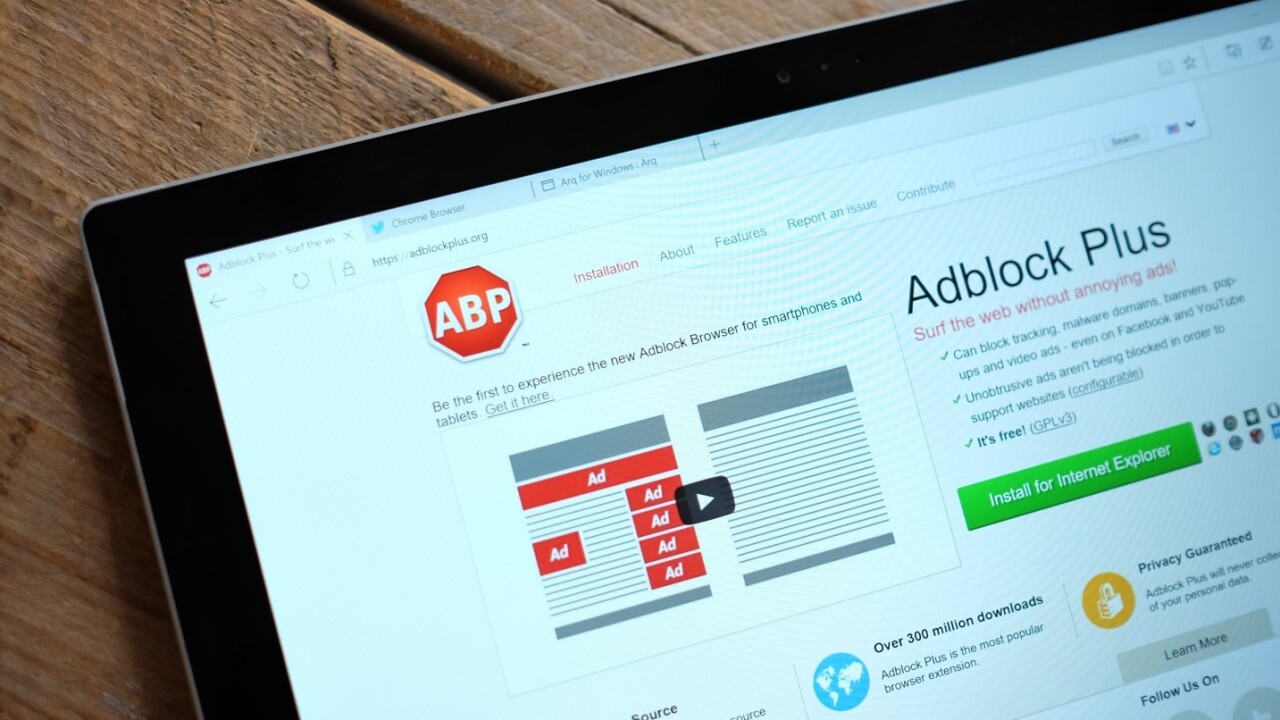
Eyeo, the firm behind the popular AdBlock Plus plugin, just scored a major victory in Germany’s Supreme Court. For the past few years, the firm has been embroiled in a battle with publishing giant Axel Springer over its acceptable ads program.
In 2015, a group of German media publications sued Eyeo, eager to put a stop to adblocking as a practice. They failed, but the following year, Axel Springer won a minor victory that forced Eyeo to whitelist certain adverts for free.
AdBlock Plus runs an “Acceptable Ads” program, where adverts deemed to be respectful of the user experience are whitelisted. While this program is free for smaller sites and publications, larger institutions (like Axel Springer, which had €3.3 billion in revenue in 2015) are expected to pay.
The Acceptable Ads program is a major part of Eyeo’s business model, and thus it appealed this ruling at the German Supreme Court, who found in favor of the adblocking company. Earlier today, it released a triumphant press release, where its head of operations and communications, Ben Williams, said:
“Today, we are extremely pleased with the ruling from Germany’s Supreme Court in favor of Adblock Plus/eyeo and against the German media publishing company Axel Springer. This ruling confirms — just as the regional courts in Munich and Hamburg stated previously — that people have the right in Germany to block ads. This case had already been tried in the Cologne Regional Court, then in the Regional Court of Appeals, also in Cologne – with similar results. It also confirms that Adblock Plus can use a whitelist to allow certain acceptable ads through. Today’s Supreme Court decision puts an end to Axel Springer’s claim that they be treated differently for the whitelisting portion of Adblock Plus’ business model.”
“We are excited that Germany’s highest court upheld the right every internet citizen possesses to block unwanted advertising online. As we have since 2014, we will continue to fight for users’ rights in Germany and around the world,” he added.
We won!!!! German Supreme Court fully confirms that ad blocking in general and @AdblockPlus in particular are 100% legal! pic.twitter.com/kqPJV11FK4
— Tim Schumacher (@TimSchu) April 19, 2018
This is tremendous news for consumers in Germany. It affirms that people have the right to control the content they see on their computers.
But for those in the media who still think that adblocking can be stopped, it’s a resounding reminder that we have to move on. The cat is very much out of the bag.
I totally understand why Axel Springer fought Eyeo so ferociously. As someone who works in ad-supported media, I get that advertising (partially) pays the bills and allows for me to put food on the table. But that shouldn’t allow me (or any publisher, for that matter) to dictate what software someone can and cannot run on their computers.
Put simply: someone’s business model shouldn’t trump another person’s human rights.
I’m a little puzzled why Axel Springer started this fight in the first place. It feels like it’s fighting a war that was lost decades ago. Adblocking is now mainstream across all age groups, according to Pagefair’s 2017 AdBlock Report. The same paper says an astonishing 615 million devices now use adblocking software.
And with Google Chrome now blocking bad adverts by default (and adblocking software included by default in other browsers, most notably Opera), that number will only increase.
Take it from someone who works in ad-supported media: there’s still a future for advertising on the Internet. It’ll just look a little different.
Consumers will have a stronger say in the adverts they see. Gatekeepers like Eyeo and Google will ensure that adverts aren’t like what they used to be: deceptive, intrusive, and a conduit for malware.
In the same way a traditional print publication might have an advertising department that approves and rejects adverts, systems will be put in place to ensure standards exist online.
As a journalist, the widespread nature of adblocking can sometimes feel like a bitter pill to swallow. That said, it’s less troubling when you stop looking it as an attack on your industry, and instead consider it to be a form of quality control for digital advertising.
This new future of advertising probably won’t be enough to pay the bills. The CPM won’t be as high as the more intrusive adverts of old. That should’t be a problem though, as publications are increasingly good at diversifying, and finding new revenue streams to subsidize their journalism.
Sites like Recode, TNW, and TechCrunch, for example, host events and conferences that people pay hundreds (or, in some cases, thousands) of dolars to attend. We have one coming up in Amsterdam next month, and we’re expecting 15,000 attendees.
This model can also work for traditional publications, too. In 2012, The Guardian experimented with a two-day conference with an event billed The Guardian Open Weekend. Over 5,000 people paid between £40 and £60 to hear from speakers as diverse as director Steve McQueen, to correspondent Gary Younge, and Mumford and Sons frontman Marcus Mumford.
Other sites, like tech.eu, sell high-quality research papers to investors and analysts. Remarkably, some publications are becoming investors themselves.
Last year, the Guardian Media Group launched its own venture capital fund. This ambitious effort will see it sink as much as £42 million into startups in AI, adtech, payment technologies, and content distribution.
And then you’ve got other viable money-making avenues to explore, like paywalls, native advertising, and affiliate links. These are all realistic and workable ways to bring in the bacon, while respecting your audience’s time, attention, and computer.
And frankly, it’s a lot more fun to explore these new models of funding journalism than fighting battles lost years ago.
Adblocking is here to stay. It’s time to move on.
The Next Web’s 2018 conference is just a few weeks away, and it’ll be ??. Find out all about our tracks here.
Get the TNW newsletter
Get the most important tech news in your inbox each week.




